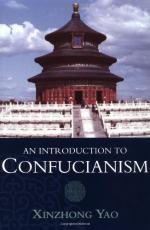|
This section contains 8,283 words (approx. 28 pages at 300 words per page) |

|
Confucianism as an Ethical Tradition
After the Zhou people conquered the Shang people in the middle of the eleventh century BCE, the early Zhou kings ruled by letting feudal lords govern vassal states. As their powers grew, feudal lords fought one another and resisted the Zhou king until the state of Qin conquered all other states in 221 BCE. A number of ethical and political thinkers lived in the period from the sixth to third century BCE, proposing different ways of restoring order as well as ideal ways of life for human beings. Among them, several thinkers, including Confucius (sixth century BCE), Mencius (fourth century BCE) and Xunzi (third century BCE), as well as their followers, were regarded as belonging to the same movement of thought. This movement of thought was referred to retrospectively in the Han dynasty (206 BCE to 220 CE) as rujia, or the school of ru. The...
|
This section contains 8,283 words (approx. 28 pages at 300 words per page) |

|


